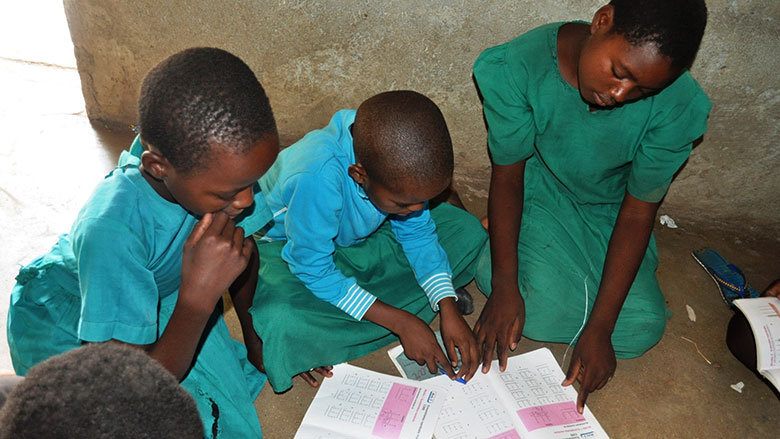LILONGWE, April 26, 2016 - After a four-year textbook drought, a truck laden with textbooks arrived at Malimbwe Primary School in Mitundu, central Malawi in February. This was a result of joint efforts by civil society and the community supported by the World Bank’s social accountability program to address a major problem derailing primary education outcomes in Malawi.
The World Bank’s Global Partnership for Social Accountability (GPSA) is financing complementary projects by the Malawi Economic Justice Network (MEJN) and Care Malawi, aimed at strengthening accountability and the effectiveness of textbook distribution. Each project costs up to $1 million, and both will close in 2017.
The two leading organizations, along with partners such as the Civil Society Education Coalition (CSEC), have developed a tool for parents and teachers to keep track of textbook delivery in their schools, and have trained them in the use of the tool. Other existing structures such as the school management committees, parent-teachers associations, and mother groups have been empowered to monitor deliveries.
“In the past we did not have a system for tracing or documenting textbooks from government or donors. We have now been taught and we have records for the books,” said Chrisford Kazipatile, headteacher of Tsabango 1 Full Primary School in Lilongwe.
Due to the engagement with the community, the projects have raised awareness amongst parents about the serious challenges of textbook shortage and care. Consequently, the community established a system for managing textbook loses.
“We stamp our books to show ownership so that in case a book goes missing it can be easily identified and returned here,” explained Paul Kamcholoti, a parent at Tsabango 1 Primary School. He added that in the event that a learner loses a book, the parent is required to buy a replacement and not pay cash. The parents say this system ensures the school does not run out of books.
There has also been strong collaboration with the Ministry of Education, particularly with the Supplies Unit. Projects under the GPSA strive to build mutually-beneficial relationships between civil society and government to solve specific governance challenges. In these projects, the data that is gathered at the school-level is shared with the ministry to inform decisions made about textbooks. In Malimbwe, MEJN used data to identify the lack of books in the school, and raised this issue with the Supplies Unit. As a result of this collaboration, Malimbwe Primary School received the textbooks that it was lacking.
Monitoring exercises are also taking place in 60 schools in 12 districts across Malawi. Each district has five schools. The districts are Balaka, Chikwawa, Dedza, Kasungu, Lilongwe, Machinga, Mulanje, Mwanza, Mzuzu, Phalombe, Rumphi and Salima.
Using social accountability tools to monitor text book deliveries will have a concrete impact in the schools targeted by the project, such as better care or more accurate information, Luis Fernando Esquivel, GPSA operations manager, said the projects will also generate information that will be useful at the national-level. By aggregating the findings from each school and identifying trends, the Implementing CSOs and the government will be able to use the aggregated data from each school to help come up with potential solutions to address systemic challenges. For example, ensuring that there are minimum standards for the delivery of textbooks.
“We are extremely excited to have had a helping hand in relaying the information about a huge challenge that has been standing in the way of access to quality education for four solid years,” said Dalitso Kubalasa, Executive Director of MEJN. “As a civil society organization, we will strive to identify gaps in public service delivery and continue to help Government deliver quality services to citizens, such as these kids at Malimbwe,” he said.
In the coming year, the teams will continue to work with all stakeholders in order to strengthen the information flow as well as to come up with policy recommendations based on hard evidence to improve service delivery in education.

